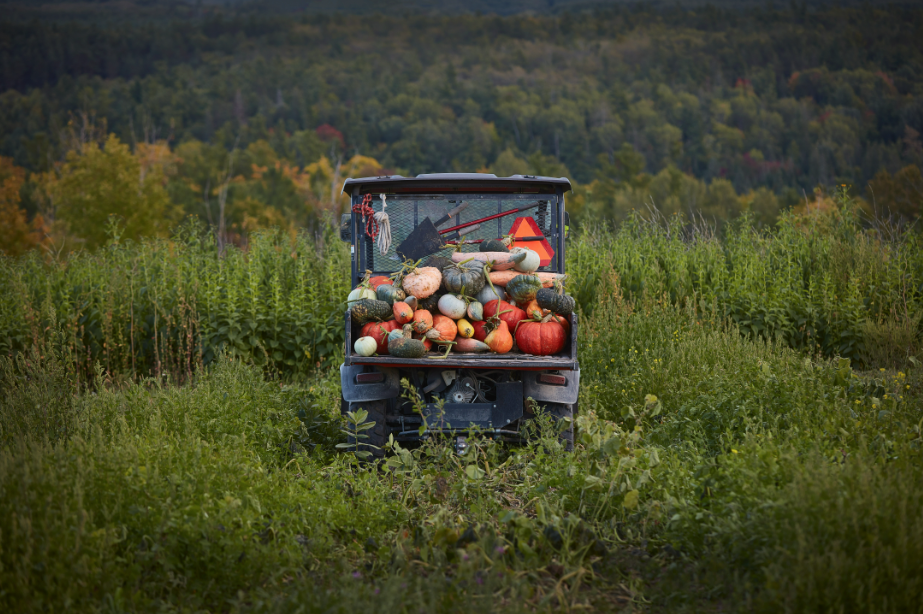
It started as our kitchen garden, growing flavourful heirloom vegetables and herbs we love to eat, grown in a way we are comfortable eating – without insecticides or herbicides. Using flowers to attract pollinators, and creating gardens separate from each other for crop rotation.
Reading and an obsession with research, fuels our quest to find and grow the most delicious varieties of the vegetables we love, like tomatoes, sweet summer onions, parsnips, asparagus, and winter squash. We read cookbooks and look at menus from restaurants all over the world looking at even the smallest ingredients. Our curiosity extends to asking chefs how they choose specific varieties, and what they wish they could find locally.
Our farm, and especially the garden, reflects the incredible people we have met on this great adventure.
We grew the Queensland Blue heirloom winter squash after a divine dinner at Combeshead Farm in the UK, and a great conversation with chef Tom Adams.
After reading a beautifully illustrated article in the New York Times ostensibly about tomato recipes, we decided to grow tomatoe varieties from Wild Boar farms in Sonoma, California.
We grow New Girl tomatoes and Jimmy nardello peppers after hosting the amazing chefs, Stuart Brioza and Nicole Krasinski of State Bird Provisions in San Francicso.
Our friends at the Pig Hotel kitchen garden in England introduced us to Crosnes, and many more unusual edible flowers.
Thanks to Dan Cox, we are now growing Crown Prince squash, and he continues to be an inspiration with his passion for the growing produce and raising animals.
We have been growing the Rose de Roscoff pink onion, after reading about them in Kew on a Plate.
We grow many varieties of heirlooms from the Slow Ark of Taste, such as our Boothby blonde cucumber and Sucrine du berry. This is part of the slow food movement and highlights varieties that have been important historically in regions but have grown out of favour in a world of hybrids.
We grow heirloom hot peppers for Chef Walsh’s secret nasty sauce.
Sometimes we grow organic open pollinated hybrids when the flavour is indisputable, like Row 7 vegetables, being developed by Dan Barbour and Cornell university.
People often ask us if we save seeds or if they can purchase seeds from us, we do neither. Our reason is that we all need to support the best protectors of heirloom varieties, the seed savers. There is much science to ensuring these beautiful tasty heirloom varieties are saved. The temptation and pressure for so many farmers to use hybrids bred to be disease resistant, have consistent and high germination rates, and visually resist blemishes and have large yields, is very strong. However, all of these hybrid varieties start with the original heirloom.











Maple Syrup
Maple Syrup is the first farming activity of the year and signals the beginning of spring. Family, friends, neighbours, and often the chefs we work with, gather in the sugar shack to catch up after the winter, share stories, and plan for the growing seasons ahead.
Livestock
We breed and raise heritage sheep and heritage pigs in accordance with animal welfare global standards. This includes our flocks of Cotswold and Shropshire heritage sheep and our Mangalitsa and Tamworth pig breeds. We also raise a small number of purebred Aberdeen Black Angus steers.
Engagement
Our purpose remains steadfast: as stewards of the land and contributing to changing the global dialogue on food. The farm facilitates engagement by offering a space for people to gather and learn about the remarkable food at Tamarack Farms.






